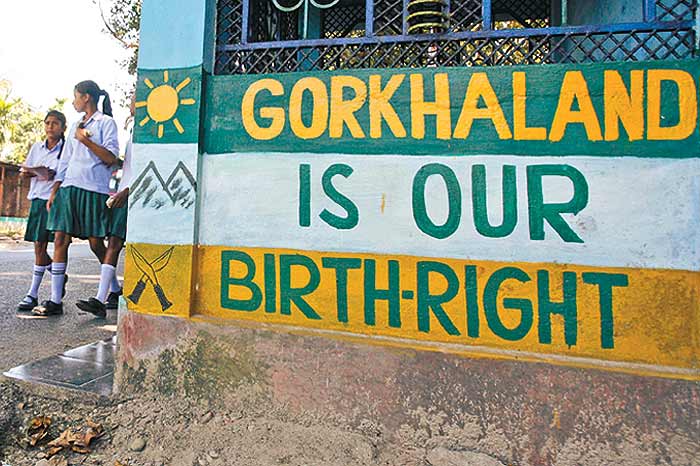In the recent weeks, massive protests have erupted in the beautiful Darjeeling and its surrounding areas. But this protest has been going on for more than 30 years now. This is the demand for a new state called Gorkhaland to be formed by including the cities of Darjeeling, Kalimpong, Kurseong, and Mirik. Darjeeling and surrounding areas have been administered by different parties throughout history. Till the 18th century they were under the Kingdom of Sikkim. A Nepalese invasion meant that the whole area came under the control of Nepal, and after the Anglo-Nepalese War in which the Kingdom of Sikkim allied with the British East India Company, all these areas came under the control of the British.
In 1947 when India became independent, all these areas became a part of the West Bengal state. In India, states have been largely formed on the basis of language or on the basis of culture. The linguistic and cultural differences have actually been the reason for the formation of states.
Gorkhaland qualifies for a separate statehood because it satisfies both these criteria. It is culturally different from the rest of West Bengal and the language spoken over here is primarily Nepali and not Bengali as is the case in the rest of West Bengal.
In the 1980’s Gorkha National Liberation Front (GNLF) started the Gorkhaland movement. The agitation led to the setting up of the Darjeeling Gorkha Hill Council (DGHC) to govern the areas under certain Darjeeling district. In 2007, Bimal Gurung split away from the GNLF and founded a new organization that became the leader of the Gorkhaland movement. This was the Gorkha Janmukti Morcha (GJM) which is now the most formidable force in the Gorkhaland movement. Talks were held between the Government of India, the Government of West Bengal, and the GJM. The Bharatiya Janata Party pledged its support to the GJM and endorsed its stand on the creation of a separate state called Gorkhaland.
In 2009, Jaswant Singh was elected to the Lok Sabha from Darjeeling with the support of the GJM. The BJP included the creation of Gorkhaland in its 2014 General Election manifesto and once again won the elections with the support of the GJM. In 2011, the talks between the centre, state, and the GJM led to the establishment of the Gorkhland Territorial Administration (GTA). The West Bengal CM Mamata Bannerjee claimed that the Darjeeling issue was now resolved but Bimal Gurung stated that the creation of the GTA was the first step in the creation of a separate Gorkhaland state.
In the maiden elections held to the GTA, the GJM swept the polls indicating huge support for Gorkhaland. In 2013, the proposal to create the new state of Telangana provided fresh impetus to the Gorkhaland activists. Bimal Gurung quit from the GTA stating continuous interference from the West Bengal government and pursued the agitation for a separate state. In August 2013, all parties came together and for the first time ever in more than 100 years all the parties of the Darjeeling hills came together and pressed for the formation of Gorkhaland and formed the Gorkhaland Joint Action Committee (GJAC).
With the BJP coming to the power at centre in 2014, the Gorkhaland activists probably thought that their dream of a new state would finally come true because the BJP had supported them on multiple occasions. However, in three years of the Modi government, no such step has been taken. The recent move of the West Bengal government to make Bengali compulsory across the state has added fuel to the fire and Darjeeling is on the path of agitation and protests once again. The state government mellowed its stand after a while and stated that Bengali would be an optional subject in the hills but the movement for Gorkhaland has picked up once again now.
This time it appears that the GJM is determined to make sure that whatever happens, Gorkhaland is formed at any cost. The demand for Gorkhaland is justified to a very large extent because the region shares very few similarities with the state of West Bengal. The complaint that the West Bengal government is imposing its influence on the Gorkha people has been there for a long time now.
Moreover, West Bengal is a very large state with fourth highest population in the country. A smaller Bengal definitely will be easier to administer so it will be a win-win for both parties.
There are already several demands for the creation of new states in India.
Many are unjustified demands but Gorkhaland is definitely a justified demand and since it was a part of the 2014 General Election manifesto of the BJP, the centre must initiate proceedings and ensure that the West Bengal government cooperates and Gorkhaland is formed. It would be a win-win for all parties involved.
